Almost a year after the Newport Uprising took place on November 4th, 1839, two men from Bath held an open air meeting about the People's Charter in Baneswell. With outdoor meetings being restricted, the two men were apprehended shortly after and taken to court.
The meeting took place in Victoria Square, Baneswell which was demolished in 1958.
The Monmouthshire Merlin reported on the trial and apart from having to provide bail, the men weren't prosecuted.
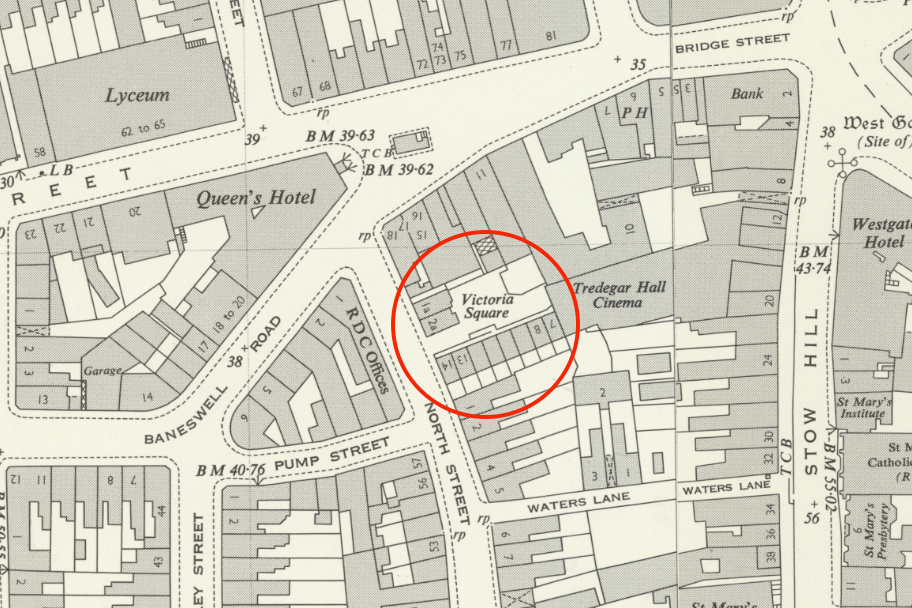
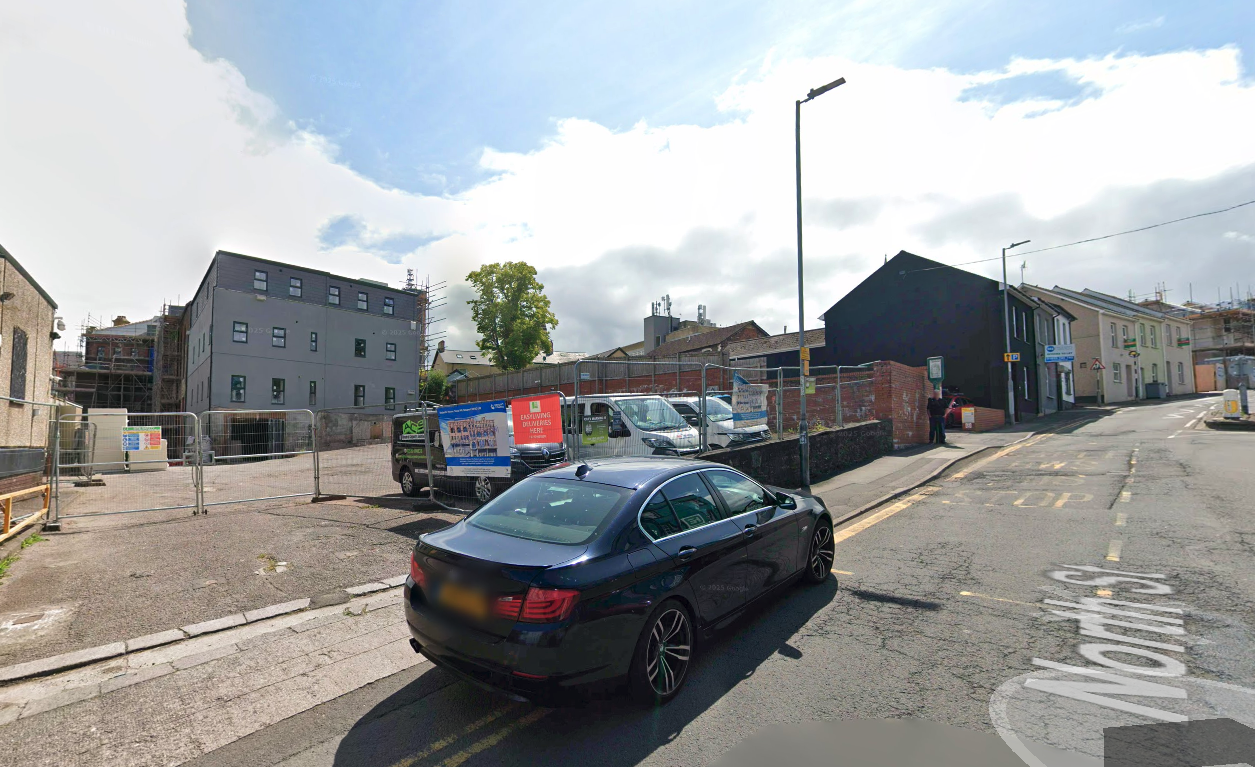
The location of Victoria Square. The car park is pretty much the exact size of the square.

The Monmouthshire Merlin printed a summary of the incident in its Saturday 31st October edition of the newspaper.
Chartist Meeting
We deeply regret that these restless and designing men, whose bad industry last year was attended with such fatal results, have again essayed to mislead the minds of the people of this district, but happily without success.
On Monday morning considerable alarm was excited in the town, in consequence of a bill being generally placarded, announcing that a chartist meeting would be held in Victoria-square in the evening. The magistrates on being informed of this fact, caused a notice to be immediately printed and issued, warning the inhabitants from attending such meeting.
In the evening, at the appointed hour, from a hundred and fifty to two hundred persons assembled in front of a house in Victoria-square, occupied by a person named Williams, from the window of which they were addressed by two persons named Philp and Bolwell, from Bath and as we understand, by another person named Cromar, of this town, who, we are informed, is recognised as one of the leaders of the chartist society.
Their addresses were listened to rather coolly by the crowd, and at the conclusion, when some one in front of the house called for three cheers for the charter, it was not responded to by those present. After the conclusion of the speeches, the meeting quietly dispersed. On the following day Philp and Bolwell, in their progress of agitation, were proceeding towards Pontypool, when they were taken into custody on a warrant signed by the borough magistrates, and safely lodged in the lock-up house.
— Monmouthshire Merlin, 31st October, 1840

Here is the account from the court when they appeared two days after the meeting on Wednesday 28th October.
Examination of Bolwell and Philp
Before Thomas Hawkins, Esq., Mayor Sir Thomas Phillips; Rev J. Coles; S. Homfray, and William Brewer, Esqrs.
Thomas Bolwell and Robert Philp, were charged with conspiracy, and being present at an illegal meeting. In consequence of its being understood that the case was to come on, the hall was densely crowded.
Sir T. Phillips (to the prisoners): Do you wish the assistance of any professional gentlemen? Bolwell: No, Sir Thomas.
Sir T. Phillips: Do you wish to hear the warrant read? Yes. The warrant, on which the prisoners were apprehended, was then read.
Police Sergeant Cormack was then sworn and examined, by Sir T. Phillips, and stated that on Monday morning he heard that a Chartist meeting was to he held in Victoria-square, on the evening of that day, and shortly afterwards, about half-past one o'clock in the afternoon, he saw bills posted on the walls announcing the meeting. In the course of the afternoon he received the copy of a bill from the Magistrates, to have printed. (Witness here produced the bill.)
Sir T. Phillips to prisoners: Do you wish to see the handbill convening the meeting. Philp: 1 have seen one; I do not want one handed to me.
Sir T. Phillips: Do you wish to see the handbill issued by the Magistrates? Bolwell: Yes. The bill issued by the magistrates was then handed to him.
Examination resumed. —Immediately the bills were ready witness distributed some himself, and saw that others were posted up some of them were posted about the place of meeting. He began distributing them about twenty minutes past four, and proceeded to the place of meeting about seven. At that time there were but few persons present. He then left, and returned again, and at different times, during the evening. There were about 200 persons present, and at some periods witness believed more. The place where the meeting was held is called Victoria-square: it is surrounded by houses, and is within the borough. The night was very dark. The crowd caused obstruction to persons going to and from their houses. Heard more than one person address the meeting the persons speaking were inside a house: believes the name of the occupier of the house to be Williams.
Bolwell was the first who addressed the meeting his address lasted a few minutes, and he was followed by a person in the room, who seemed to be acting as chairman. This person introduced Philp to the meeting. Philp addressed the crowd for about a quarter of an hour: the subject of discussion was the People's Charter. Witness learnt that shopkeepers and others were alarmed while the handbills were distributing.
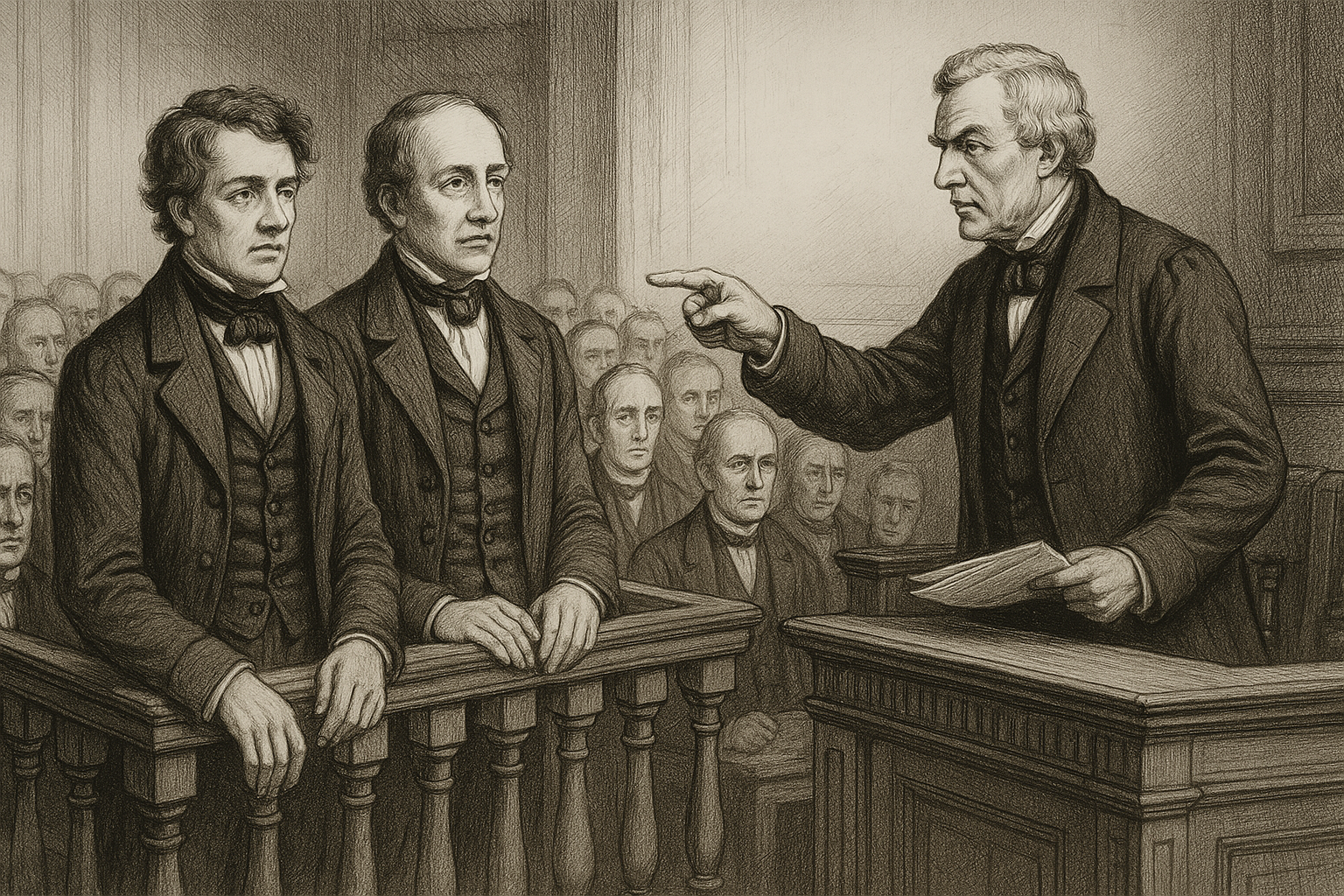
Cross-examined by Thomas Bolwell: I here were about 100 bills posted and distributed they were posted and distributed from between twenty minutes past four and a few minutes past five. Witness went to the meeting about seven. There is a thoroughfare at the bottom of the square, but cannot tell if there is any way out at the top. Cannot tell who the first person was that addressed the meeting; "the first I heard," said witness, "was you." Was not there at the commencement the subject was the people's charter.
Cross-examined by R. Philp: Cannot tell what time the first bills were out: saw them about half-past one on Monday: the second bills were out about twenty minutes past four, those signed by the Magistrates: it was then light. There were about 100 bills distributed. Cannot say what the population is to a few thousands, but is given to understand about 16,000 or 18,000. Cannot say whether 100 bills were sufficient to warn a population of 16,000 or 18,000 in so short a time.
The bills were generally distributed about the place of meeting, and in the shops witness distributed the greater part of them himself. Did not give him (Philp) one; but would, had he applied. Witness knows the shopkeepers pretty well but is not acquainted with them. Can name an individual who was alarmed, but did not feel called upon to name the person. Was there the greater part of the time the meeting was being held there were three cheers given at one time. Do not believe cheers to be always alarming: they are, or are not, according to circumstances. Witness was not alarmed himself. Was near the window from which the speakers spoke part of the time was within a few yards of the window when the cheering was given was near enough to hear what was said heard the person telling the meeting not to cheer: heard the same person speaking of the advantages of peace and order: heard the meeting requested to separate peaceably. Was there at the time the meeting was adjourned. Saw no disturbance did not hear any person in the square complain of the meeting did not hear after the meeting was adjourned any other person address the people: did not hear any person in the square speak about the Corn-laws.
To Sir T. Phillips: Did not hear anything about getting home anybody, or freeing anybody. The meeting was held at the lower corner of the square. The Magistrates assembled on Monday last, and their attention was called to the bill seen by witness between one and two. They immediately drew up the notice produced: it was given to the witness with instructions to have it immediately printed and distributed. At the time witness was distributing them some of the inhabitants in the square expressed a wish that the Magistrates would prevent the meeting.
In answer to a question by Bolwell, witness said he did hear some one say that they came to inculcate good morals into the minds of the people.
Edmund Harrhy was the next witness examined by Sir T. Phillips: he said, I am a printer living in Commercial-street, (produced the manuscript from which he printed the notices calling the meeting); it was brought to me on Sunday the 25th October. The person was a stranger to me he gave his name to me on Monday as Cromer. Printed 200 copies, and delivered them to the person calling for them, at about half-past ten on Monday.
Police Sergeant Cormack, recalled by Sir T. Phillips: The meeting dissolved about twenty minutes before eight.
Sir Thomas Phillips then addressing Bolwell, observed, that the magistrates would hear any thing he had to say.
Richard Bolwell then said he was astonished, on reading the warrant, to find that they were charged with conspiracy. They had no such intention, and thought they were only to answer for holding a meeting. He was happy that the evidence was not such as to require him to defend himself from so serious a charge as conspiracy.
He believed it the duty of every man to do what he possibly could, to raise the condition of the working classes to make them acquainted with the laws by which they are governed and also the laws by which they may better their condition, if such could be done by promulgating principles of sound morality. This he endeavoured to do, and never attempted any other means.
He then went on to say that he had some business in Wales, and his young friend Philp, agreed to accompany him. A letter was published in the Western Star, to the effect, that they would be in Newport, on Monday, and that they intended lecturing as they passed through but they did not intend holding meetings in the open air; and he was rather surprised, on his landing here, to have a hand-bill shown him, calling the meeting in the open air.
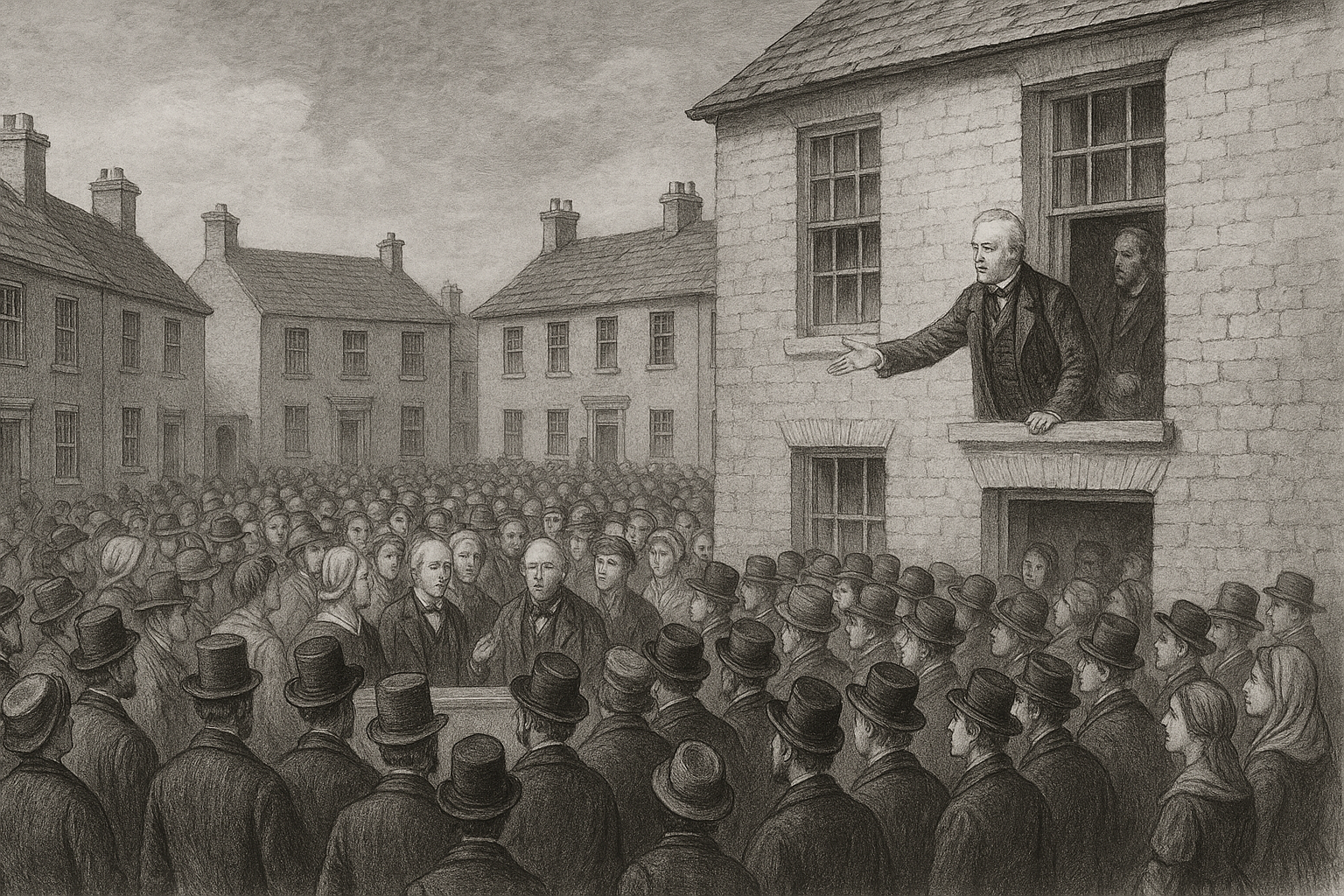
He then said it was not their intention, and asked if a room could not be procured, but was told that the magistrates were so prejudiced, that it would be useless to try; as no one would let them have a room, for fear of incurring displeasure. When they met they did not go into the subjects intended. They told the meeting it was necessary to practise morality, and no doubt, in time, they would get the chief magistrate himself to procure a place of meeting for them. He said in conclusion, he did not know that the meeting was illegal, and had the authority of lawyers of the first eminence, as well as some of the judges of the land, who had argued that similar meetings were not illegal. He tendered his grateful acknowledgments to the magistrates for their kindness in giving him their attention, as also for not pressing to make out a more aggravated case, which perhaps, had they been inclined, they might have done.
After a few moments' consultation between the magistrates, Sir Thomas Phillips, addressing the prisoners, said that from the respectful manner in which they had conducted themselves, the magistrates would not put them to any further inconvenience than was necessary, and if they were not prepared with bail, but could name any reasonable time, they might remain in custody in Newport, and not be sent to Usk or Monmouth, where, perhaps, their friends would not be able so easily to reach them, He then ordered them severally to find bail themselves in £50 each, and two others in £25 each, to appear and answer any charge that might be brought against them at the ensuing sessions, and likewise for their good behaviour.
R. Philp said that he was also surprised at the charge of conspiracy being laid against them, as they had not the remotest idea of such an offence. He had nothing further to say, as he entirely concurred with the observations of Mr. Bolwell. Mr. Dickinson immediately offered himself, and was accepted. for Richard Bolwell, and Mr. Aust, having sworn himself worth £50 after his debts were paid, was accepted tor Philp.
— Monmouthshire Merlin, 31st October, 1840

About Victoria Square
The earliest mention of Victoria Square I could find was in December, 1837 when William Colmer and Isaac Jones who lived there were appointed petty-constables.
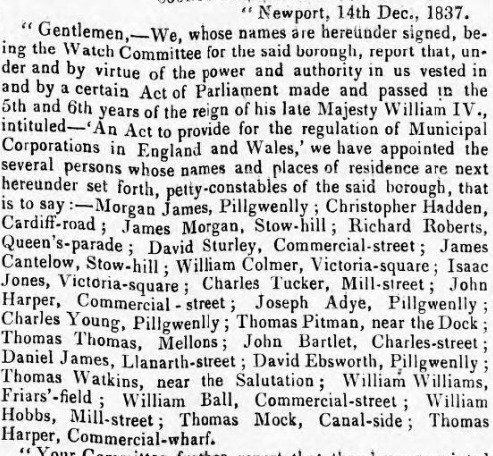
There's another mention in November 1839 when a witness in the trial of the Chartists mentioned that one of the prisoners — Solomon Britton — stayed in his house.
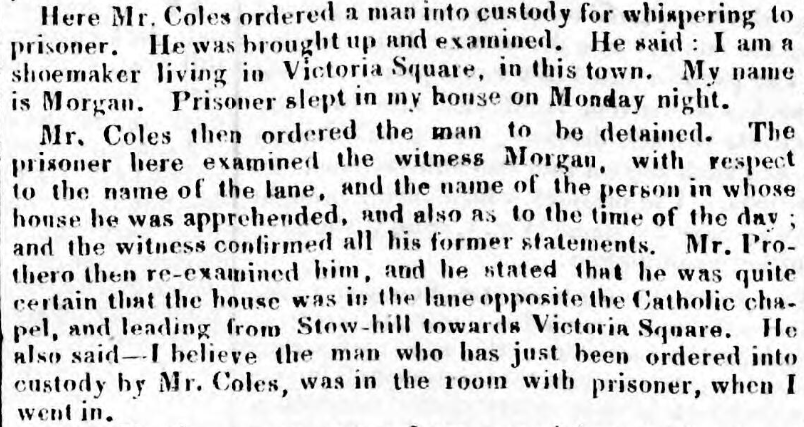
Around the time of the meeting it was mentioned in an advert that there were 23 cottages in the square so when compared to the map at the beginning of the article from around the 1950s which shows around 10 houses, they would have been packed in.

Confusingly, an article in 1851 mentions present-day Park Square as being called Victoria Square but it appears that all other references in adverts and articles are referring to the square in Baneswell.


The square remained until 1958 when the council used the Housing Act of 1957 to demolish them. The purpose of the act was to focus on improving housing standards and conditions so it gives an indication of the quality of the housing.
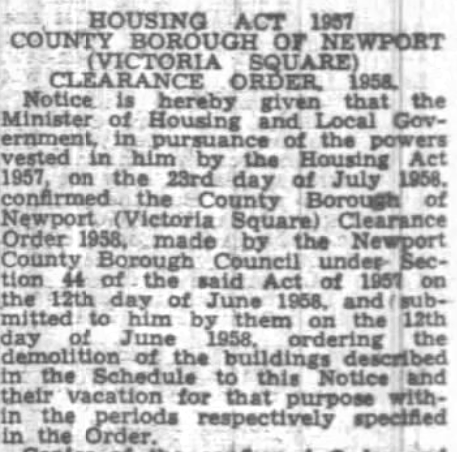
After being demolished it was turned into a car park. Numbers 1 and 2 North Street were still there in the map below but no longer exist and is now the car park behind the Pen and Wig. I'm not sure if they were eventually demolished for a similar reason.
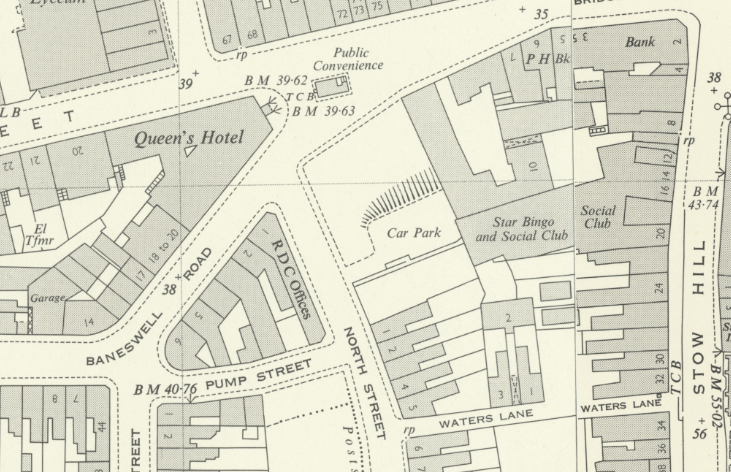


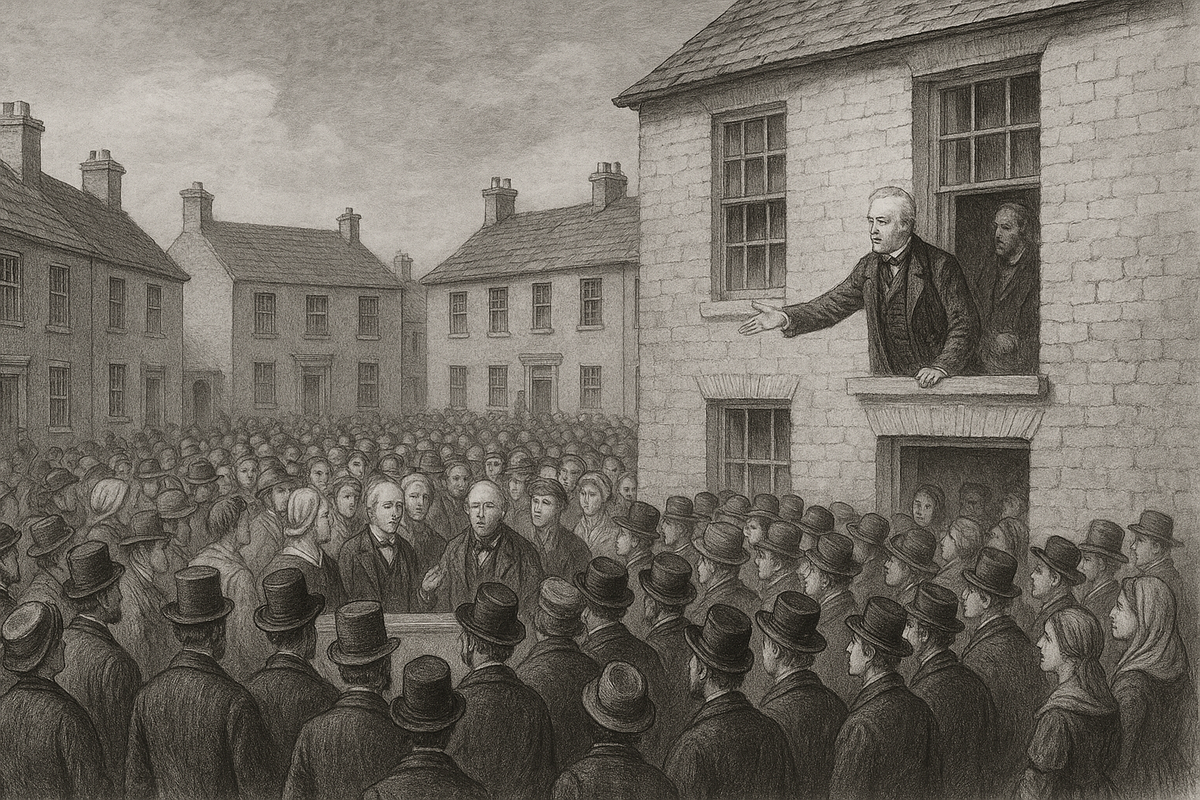
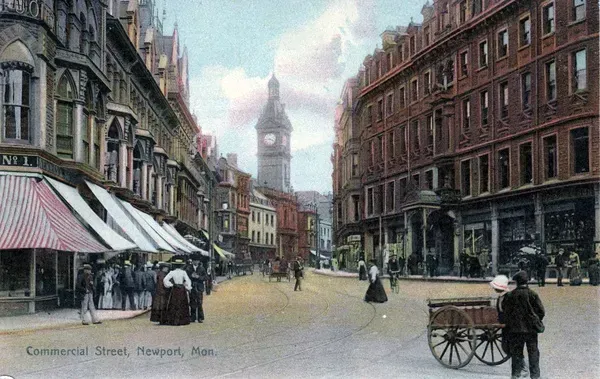
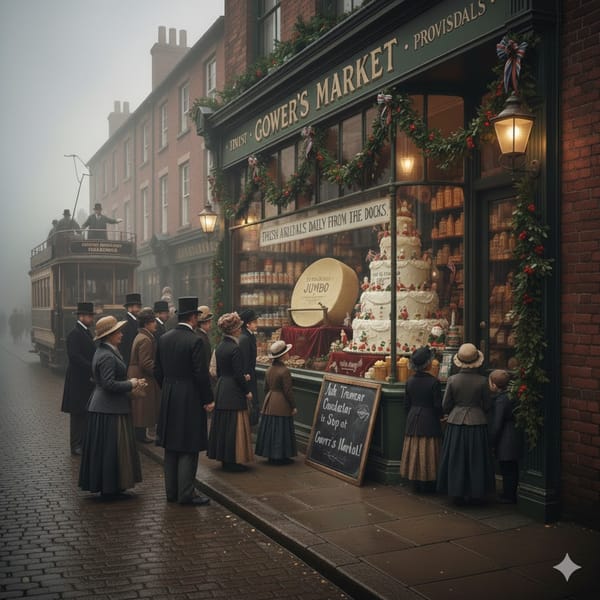
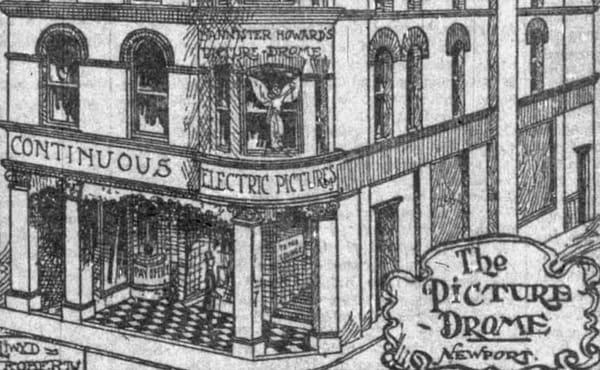
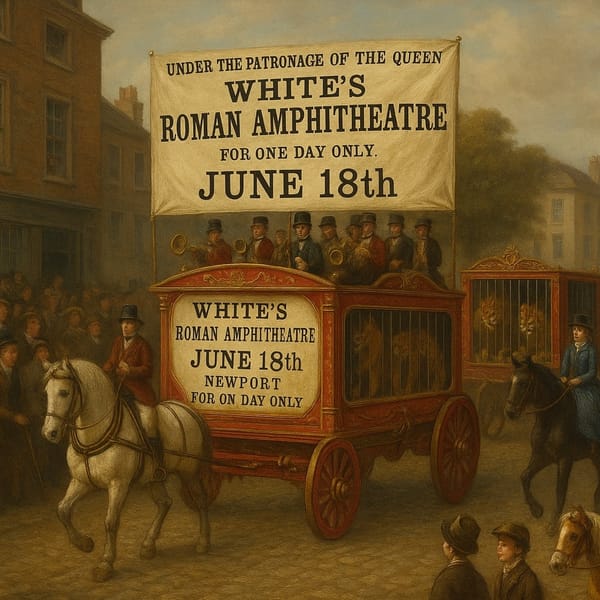
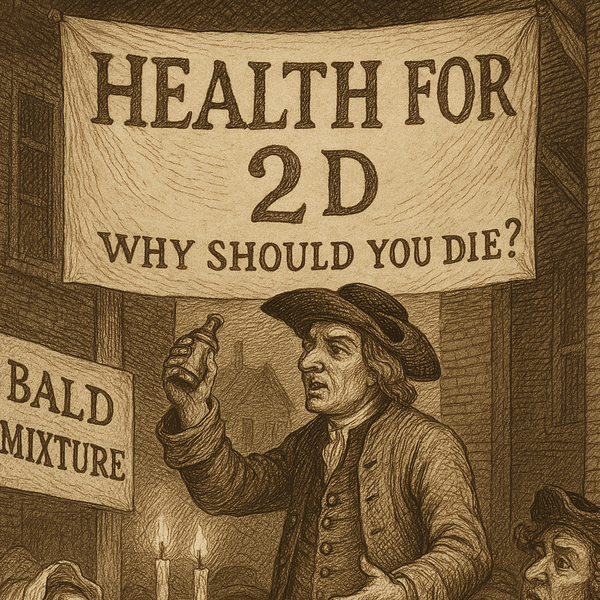
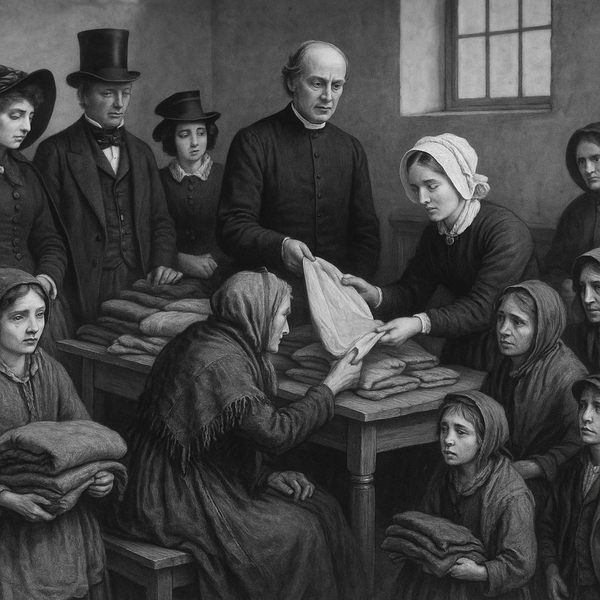
Member discussion